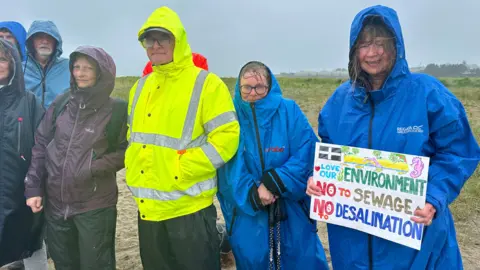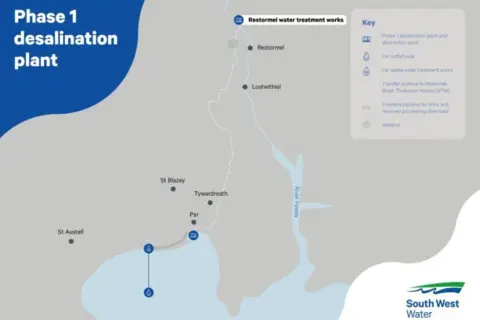Campaigners oppose test drilling in Cornish bay
 BBC
BBCCampaigners opposed to plans for a desalination plant in Cornwall say test drilling is unnecessary and would destroy marine life.
South West Water (SWW) has applied for a licence to conduct test drilling in St Austell Bay before moving ahead with its plans for the plant in Par.
People have until Wednesday to comment on the plans.
SWW said desalination was "one important step in a wider programme of work" and it was working to minimise any impact on marine habitats.

Desalination plants remove salt from seawater to produce clean drinking water but the Par project has always been controversial.
The campaign group Say No to Desalination in Cornwall has been posting on social media and staging pop-up events in Par and St Austell to rally support.
Currently its focus is South West Water's application to the Marine Management Organisation (MMO) for a licence to conduct test drills in St Austell Bay.
'It's not necessary'
Jenny Tagney, from the campaign group, said they were up for a lengthy battle, adding: "It would destroy our marine life, it would destroy an awful lot of ancient Cornish hedges on land and it's not necessary."
Deborah Hazeldean has also registered her objection.
She is worried the test drilling site will impact an area of maerl, a rare seaweed.
She said: "Maerl is a massive carbon sink, it stores more carbon than temperate rainforest and is incredibly delicate."

In response, SWW said: "Our current reservoir levels may look healthy following a wet winter and the interventions we and our customers have made but the impact of climate change tells us we need to be more resilient to drought.
"Regulators are encouraging water companies to develop supplies that are resilient to the impacts of climate change and desalination is one important step in a wider programme of work we are delivering to ensure resilient supplies across our region.
"We share the passion that many locals have shown to protect the sensitive marine environment in St Austell Bay.
"We are taking more time to fully understand this environment to allow us to enhance our proposals and be sure that we are doing everything we can to minimise any impact we have to marine habitats."
 SWW
SWWSouth West Water has put desalination at the centre of its £125m project to increase water resources in the region but the water company has faced a series of setbacks.
The initial plans for two plants to provide more than a third of Cornwall's drinking water - about 60 million litres a day - had to be scaled back.
In October 2023, the project to build a single plant was delayed, then reduced in size again to produce between two-and-a-half and five million litres of clean drinking water each day when needed.
The water company said it was determined to push on with its strategy to build two desalination plants in Cornwall, which it said would boost Cornwall’s water resources by approximately 45% by 2025.
Follow BBC Cornwall on X (formerly Twitter), Facebook and Instagram. Send your story ideas to [email protected].
